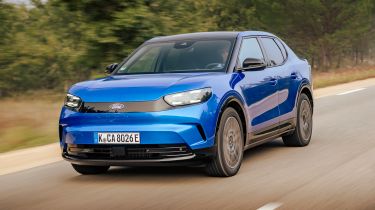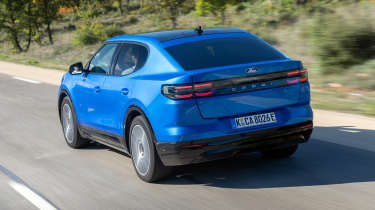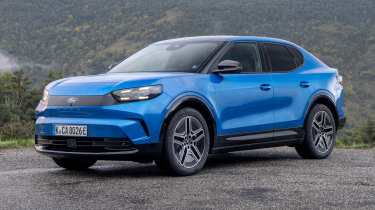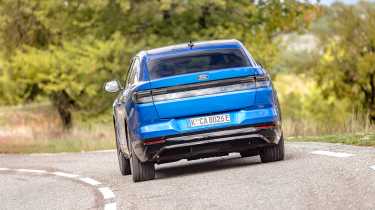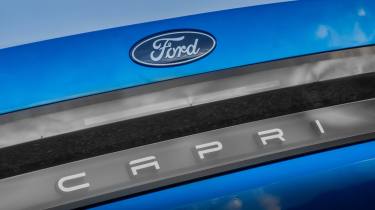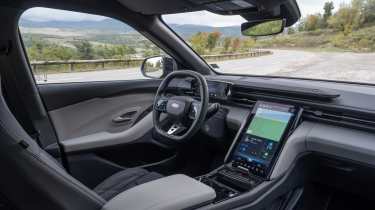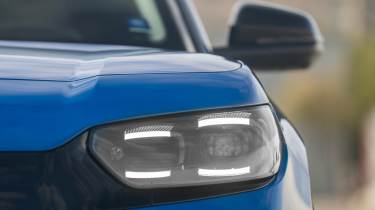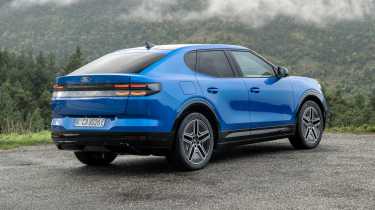Ford Capri review
This mid-size electric coupe-SUV might have a controversial name, but don’t let that put you off
Pros
- Refined on the move
- Well put together
- Upmarket cabin
Cons
- Pricey to buy
- Not very exciting
- Questionable name
| Range | Wallbox charge time | Rapid charge time |
| 232-390 miles | 7hrs 30mins - 10hrs 45mins (0-100%, 7.4kW) | 25-28min (10-80%, 135-185kW) |
The original Ford Capri was a stylish sports coupe designed to be affordable for the masses back in its heyday. Now, decades after the name was mothballed by the brand, this beloved moniker has made a comeback.
There’s a big difference this time round, though, as the new Ford Capri is a fully-electric SUV. It’s safe to say that Ford’s choice of name has stirred up some controversy among fans of the original. We’ll leave it up to you to decide whether the Capri’s resurrection is a genius marketing tactic or a travesty. Instead, we’ll focus on the merits of what is a pleasingly capable and family-friendly electric car.
The Ford Capri is very closely related to the Ford Explorer, and this, in turn, means there’s also some Volkswagen DNA to be found within the mix, thanks to Ford’s platform partnership with the Volkswagen Group. The Capri is positioned as a sleeker and more sporty alternative to the Explorer and it does a reasonable job of standing out in the increasingly crowded coupe-SUV sector.
One area where the Capri struggles to escape its Explorer roots, though, is the driving experience. While there’s an acceptable amount of shove on offer from both the single- and dual-motor powertrains, no variant of the Capri can really be described as fun to drive — another reason why fans of the original Capri are a bit upset.
The single-motor models are rear-wheel drive, and power comes courtesy of either a 55kWh battery returning up to 243 miles on the WLTP combined cycle, or a larger 77kWh battery pack, which can cover up to 390 miles. The four-wheel drive, dual-motor Capri features a slightly larger 79kWh pack, and this provides up to 346 miles between charges.
The dual-motor setup has the most power for shifting this near 2.1-tonne EV, too. A total of 335bhp and 679Nm of torque on tap means a 0-62mph time of 5.3 seconds. The 77kWh single-motor model isn’t too far behind, though, completing the landmark sprint in 6.4 seconds thanks to its rear-mounted motor producing 282bhp and 545Nm of torque. Both cars have a limited top speed of 111mph.
The smaller 55kWh Ford Capri is slightly more subdued in the acceleration stakes, but it certainly isn’t a slouch. 168bhp and 310Nm of torque mean a 0-62mph time of 8.7 seconds, as well as a 99mph top speed.
While things remain largely pleasant and refined when driving the Ford Capri, both in town and on the motorway, spirited driving through fast corners results in a controlled and predictable experience rather than an entertaining one.
For those who prioritise capability over character, though, the Capri should tick the right boxes. Very little of the Explorer’s cabin space has been sacrificed in order to achieve the Capri’s more curvaceous exterior and sloping roofline, and up to five occupants will be able to sit comfortably inside. There’s a decent amount of useful storage space and neat cubby holes on offer, too, while the 527-litre boot should prove more than enough for most everyday needs.
This all comes at a considerable price, though, as the entry-level Ford Capri starts from just north of £42,000 for the 55kWh model. Opting for the 77kWh car bumps the price up and over the £48,000 mark, while the 79kWh dual-motor commands more than £56,000. Along with the powertrains, there are also two trim levels to choose from: Select or Premium.
Select trim includes a 14.6-inch touchscreen infotainment system, 19-inch wheels, a reversing camera, all-round parking sensors, electronically adjustable and massaging driver’s seat, heated front seats, keyless entry and start and intelligent cruise control.
For those who are willing to shell out a premium of around £4,100, the range-topping Premium trim adds in a powered tailgate, panoramic glass roof, Matrix LED headlights and a 10-speaker Bang & Olufsen sound system.
At these kinds of prices, there are plenty of electric SUV rivals for the Capri to contend with. First of all there’s its very own sibling, the Ford Explorer, as well as its Volkswagen ID.4 and ID.5 cousins. On top of these models, the Hyundai Ioniq 5, Kia EV6, Peugeot E-3008 and Vauxhall Grandland will enter the equation, to name just a few.
Range, battery size & charging
| Model | Range | Wallbox charge time | Rapid charge time |
| Capri 52kWh Standard Range Select | 242 miles | 7hrs (0-100%, 7.4kW) | 25min (10-80%, 145kW) |
| Capri 77kWh Extended Range Select | 390 miles | 10hrs 15mins (0-100%, 7.4kW) | 28min (10-80%, 135kW) |
| Capri 79kWh Extended Range Select | 346 miles | 10hrs 30 mins (0-100%, 7.4kW) | 26min (10-80%, 185kW) |
The Ford Capri doesn’t set any new standards for charging speeds or battery range, but the line-up does offer some highly respectable figures nonetheless.
The headline-grabber in terms of range is the single-motor model with 77kWh battery pack. This car has an official WLTP combined range of 390 miles when fitted out in Select trim, but the range-topping Premium trim’s larger wheels knock this down to 370 miles.
For those who desire more power, the dual-motor car’s 79kWh battery returns up to 346 miles on the WLTP combined cycle, so the trade-off between range and performance is fairly minimal. The smallest 52kWh battery pack, meanwhile, is also a pretty admirable performer when it comes to distance, as this carries an official WLTP combined figure of 243 miles, or 232 miles in Premium trim.
Our 77kWh test car returned an average of 3.8m/kWh when we drove it at fairly low speeds on a mixture of roads in warm weather. It remains to be seen how the colder winter months will affect the Capri, but the optional heat pump will almost certainly be a sensible investment to help preserve range.
When it’s time to top-up, the 52kWh battery has a peak DC charging rate of 145kW, the 77kWh is slightly slower at 145kW, while the largest 49kW pack can reach speeds of up to 185kW. The result is a 10-80% rapid charging time of between 25 and 28 minutes, depending on your chosen model.
Running costs & insurance
With prices ranging from around £42,000 to well over £56,000, the Ford Capri isn’t a cheap car to buy, and it commands a few thousand pounds more than the closely-related Ford Explorer.
There’s nothing unusual about these prices in the wider electric coupe-SUV sector, though, as the Volkswagen ID.5 starts from around £41,000. The recently facelifted Skoda Enyaq Coupe has a starting price of over £46,000, while the Volvo EC40 starts from more than £51,000. In short, the Ford Capri is competitively priced compared to similar alternatives.
When it comes to running the Capri day-to-day, it shouldn’t prove too harsh on the bank account. All electric cars are exempt from VED road tax until April 2025, but beyond this date, EVs will attract a first-year VED rate of £10, rising to £190 per year after that. Cars over £40,000 are also subjected to the expensive car supplement, also known as the luxury car tax, meaning you’ll have to pay an additional £410 per year for the first five years, too.
For those who are considering the Capri as a company car, this will incur a 2% Benefit-in-Kind tax (BiK) rate. After the 2024 tax year, BiK rates will steadily increase year-on-year to 5 per cent by 2027/2028. This is significantly less than any combustion or hybrid model, which can run as high as 25 per cent BiK.
While insurance won’t be notably cheap, it shouldn’t set alarm bells ringing, either, as the Ford Capri line-up sits in groups 20 to 33. In comparison, the Volkswagen ID.5 resides in groups 25 to 41.
In regards to depreciation, the Ford Capri remains on par with rivals like the Renault Scenic, retaining between 51 and 55 per cent of its original value over three years or 36,000 miles.
Performance, motor & drive
| Model | 0-62mph | Top speed | Driven Wheels | Power |
| Capri 52kWh Standard Range Select | 8.7 seconds | 99mph | Rear | 168bhp |
| Capri 77kWh Extended Range Select | 6.4 seconds | 111mph | Rear | 282bhp |
| Capri 79kWh Extended Range Select | 5.3 seconds | 111mph | Four | 335bhp |
The original Ford Capri was a punchy ‘pony car’ that offered a bit of muscle car magic. The new car still provides a decent shove when you floor the right-hand pedal, but it’s ultimately lacking in the excitement department.
Rather than throwing occupants back into their seats in an aggressive manner, the Capri offers a steady surge of safe and usable power when you need to get a move on. Even the least powerful 52kWh model produces a reasonable 168bhp and 310Nm of torque from its single, rear-mounted motor. This allows the near 2.1-tonne EV to cover the 0-62mph dash in 8.7 seconds, and then proceed on to a 99mph top speed.
Rear-wheel drive models fitted with the larger 77kWh battery get a power boost up to 282bhp and 545Nm, which sees the 0-62mph time reduced to 6.4 seconds. This car also has a higher top speed of 111mph.
The most powerful dual-motor variant shares this 111mph top speed, but its 335bhp and 679Nm outputs allow it to cover the 0-62mph sprint in just 5.3 seconds. Despite its hot hatch-beating credentials, it’s a safe bet that most modern Capri owners will prioritise efficiency over outright performance, though.
This may be a good thing, too, as although the modern Capri is perfectly capable of keeping up with traffic (as well as overtaking it), it falls short of putting a big smile on the driver’s face. During our tests, the Capri remained composed through corners and didn’t suffer much from body roll, a notable achievement for a car of this weight and size. Despite this, spirited driving wasn’t exactly a rewarding experience and it is clear the car is geared more towards comfort and efficiency – we’d happily choose the Capri if we were going on any long motorway journeys.
Overall all-round visibility is reasonable but it’s worth noting that if you like having the driver’s seat in a low position, the high dashboard can limit forward visibility and make pinpointing the extremities of the bonnet somewhat difficult. Given some time though, it should be no more difficult to drive than any other mid-size SUV.
For prospective buyers who are more fussed about efficiency, comfort and other sensible attributes, though, the Capri is still a strong all-rounder.
Interior, dashboard & infotainment
The Ford Capri’s interior has impressive build quality, and is packed with plenty of modern features.
There’s a small digital driver’s display that has been taken from the Capri’s VW siblings and is simple and straightforward to read while on the move. The dashboard’s centrepiece is a 14.6-inch touchscreen display operating a bespoke version of Ford’s SYNC software. We found this pretty easy to fathom and the large screen means it’s straightforward to decipher any information that’s being displayed. If you aren’t a fan of Ford’s system, wireless Apple CarPlay and Android Auto also come as standard.
Unfortunately, there aren’t any physical climate control buttons, but there are dedicated controls embedded at the bottom of the touchscreen, and thankfully these aren’t too frustrating or difficult to use. On the steering wheel, you’ll have to make do with haptic/ touch sensitive buttons which can be a little fiddly to get used to at first.
Elsewhere, some components such as the indicator stalks and gear selector have been borrowed from Volkswagen, but the overall quality of the interior is very good and a big step in a promising direction for Ford. Rather than focusing on chintzy materials, the designers have taken a more low key approach with everything feeling sturdy and built to last.
Boot space, seating & practicality
While several coupe-SUVs on the market sacrifice practicality in the pursuit of style, the Ford Capri retains much of its Explorer SUV sibling’s versatility and space.
Regardless of its sloping roofline, there are still ample amounts of legroom and headroom for both front and rear passengers. The Capri’s flat floor means rear passengers have plenty of space to stretch their feet out, too.
There’s a handful of useful storage cubbies for smaller items, which will prove particularly useful for families. The cleverly designed hidden compartment behind the infotainment screen offers enough room for wallets and a couple of smartphones, as well as twin USB-C sockets for charging. The screen also locks in place when the vehicle is left unattended.
For bigger items, the boot stands at a substantial 527 litres with the rear seats in place. Drop the 60:40 split folding rear seats and capacity grows to 1,505 litres. There’s a little extra storage under the false floor, which is ideal for taking care of small items such as the car’s charging cable. Unfortunately, there is no under-bonnet storage, as electrical components take up the space here.
Reliability & safety rating
Both the Ford Capri and Ford Explorer share many of their internal components with Volkswagen Group models, so any initial teething problems should have been well and truly ironed out. The Capri comes with a three-year, 60,000-mile warranty, which is only average for the new car market.
Seeing as the new Capri is a bit more family-oriented than its ancestors, this fully-electric SUV is fitted with a generous helping of advanced safety kit including intelligent cruise control, road sign recognition, lane departure warning, wrong way alert and lane-keeping assistance.
Similar to its Ford Explorer sibling, the Ford Capri received the full five stars available when it went through the Euro NCAP safety test. Rivals like the Renault Scenic scored better than the Capri in the child occupant and safety assistance categories, but the Ford outperformed the Renault for adult occupancy and in vulnerable road users testing .
